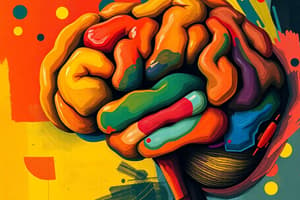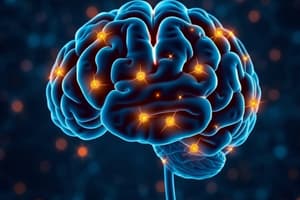Podcast
Questions and Answers
Why is understanding the intricate workings of the brain crucial?
Why is understanding the intricate workings of the brain crucial?
- To improve lung capacity
- For maintaining optimal brain health (correct)
- To develop new technologies
- To enhance muscle strength
What type of functions does the brain enable us to perform?
What type of functions does the brain enable us to perform?
- Higher emotional functions
- Higher cognitive functions (correct)
- Basic sensory functions
- Basic physiological functions
What is essential for the development of personalized medicine approaches in neuroscience?
What is essential for the development of personalized medicine approaches in neuroscience?
- Understanding human behavior
- Exploration of marine ecosystems
- Identification of new molecular and cellular processes (correct)
- Studying plant biology
Advancements in technology have allowed the extrapolation of complete information on unique what?
Advancements in technology have allowed the extrapolation of complete information on unique what?
What can be directly applied in clinical routine for diagnostic purposes based on the information on unique proteins?
What can be directly applied in clinical routine for diagnostic purposes based on the information on unique proteins?
What type of memory refers to the temporary storage and manipulation of information required for immediate tasks?
What type of memory refers to the temporary storage and manipulation of information required for immediate tasks?
Which cells play a crucial role in maintaining the blood-brain barrier and regulating synaptogenesis?
Which cells play a crucial role in maintaining the blood-brain barrier and regulating synaptogenesis?
What process involves structural and functional changes in the brain to allow for the storage and retrieval of information over long periods?
What process involves structural and functional changes in the brain to allow for the storage and retrieval of information over long periods?
Which type of cells form myelin sheaths that increase the conduction velocity of action potentials in the brain?
Which type of cells form myelin sheaths that increase the conduction velocity of action potentials in the brain?
During which stage of sleep is short-term memory consolidation believed to occur?
During which stage of sleep is short-term memory consolidation believed to occur?
What is crucial for researchers to understand hemodynamic changes associated with various brain conditions and develop targeted therapies?
What is crucial for researchers to understand hemodynamic changes associated with various brain conditions and develop targeted therapies?
Flashcards are hidden until you start studying
Study Notes
Brain Functions
The brain is a complex organ responsible for a variety of essential functions that enable us to perceive, process, and interact with the world around us. Understanding the intricate workings of the brain is crucial for maintaining optimal brain health and for the development of treatments for neurological disorders.
Subtopics
- Higher cognitive functions
- Short-term and long-term memory
- Brain physiology and pathology
Higher Cognitive Functions
Higher cognitive functions, such as cognition, learning, and memory, are complex processes that involve the interplay of various brain components. A deeper understanding of these functions is essential for the development of personalized medicine approaches in neuroscience, as it can help identify new molecular and cellular processes responsible for these higher cognitive functions.
The Role of Proteins
Advancements in technology have allowed for the extrapolation of complete information on unique proteins that may be potential targets for targeted therapies. This information can be transferred into targeted proteomics, which can be directly applied in clinical routine with the necessary features for diagnostic purposes.
Animal Models
Experimental animal models have been essential for understanding brain function and human diseases. Models that recapitulate most human neuropathophysiology have been developed for various neurological disorders, including autism spectrum disorders, Down's syndrome, Alzheimer's disease, Parkinson's disease, schizophrenia, and stroke. Research on these animal models continues to be critical for understanding brain function and human diseases.
Short-term and Long-term Memory
Memory is a fundamental aspect of brain function, and it is essential for learning, problem-solving, and adapting to new situations. Two types of memory exist: short-term and long-term memory.
Short-term Memory
Short-term memory, also known as working memory, refers to the temporary storage and manipulation of information required for immediate tasks. It is thought that dreams most likely occur during rapid eye movement (REM) sleep, which is the stage in which short-term memory consolidation is believed to occur.
Long-term Memory
Long-term memory is a more enduring form of memory that allows us to store and retrieve information over extended periods. The processes involved in the formation of long-term memory are complex and involve structural and functional changes in the brain.
Brain Physiology and Pathology
Understanding brain physiology is crucial for understanding the normal functioning of the brain and for the diagnosis and treatment of neurological disorders.
Blood Flow Speed Measurement
In vivo deep-brain blood flow speed measurement is essential for understanding brain physiology and pathology. By monitoring blood flow speed, researchers can gain insights into the hemodynamic changes associated with various brain conditions and develop targeted therapies to address these issues.
Astrocyte and Oligodendrocyte Functions
Astrocytes and oligodendrocytes play crucial roles in brain physiology. Astrocytes are involved in maintaining the blood-brain barrier, regulating synaptogenesis, and interacting with oligodendrocytes and microglia. Oligodendrocytes form myelin sheaths, which increase the conduction velocity of action potentials, and play a role in the metabolism of neurons and astrocytes.
In conclusion, understanding brain functions is essential for maintaining optimal brain health and for the development of treatments for neurological disorders. By studying the complex interactions between various brain components and the role of proteins, we can gain a deeper understanding of brain physiology and pathology, ultimately leading to the development of personalized medicine approaches for neurological disorders.
Studying That Suits You
Use AI to generate personalized quizzes and flashcards to suit your learning preferences.




